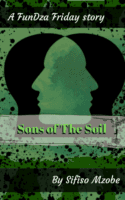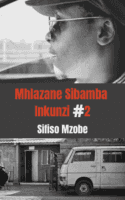Who are the good guys and the bad guys in our post-apartheid society today? What’s up with solving the ‘land question’? What is ‘white privilege’? What is class privilege? How do we lessen the massive inequality in our country?
In Sons of the Soil, Sifiso Mzobe’s plot gently takes us along a path to thinking about some of these issues, how complex it all this can be, and how we should beware of stereotypes.
At the beginning of the story we meet Matt and Naomi: a privileged couple, who we just assume are white – and we’re right. Matt is a young man with a good job in finance; a job where he can take time off to go on every private-doctor check-up with his pregnant wife. We just assume he (and Naomi) has a car, to give him this freedom of movement. We are right.
Contrast this with the situation of the young black man, Siyanda, who we meet next. He is a guy about the same age, as smart and hard-working as Matt, but this is his background:
“Where I come from I did hard farm labour from the time I was seven years old. Every day after school I had to be in the sugar cane fields. I had to work for eight years after I passed matric just to save enough money to register for my first year…”
Now he has to work and study, and it means his marks are not good enough for a bursary. Plus, he already owes money to the farm owner. There is no chance he can yet marry his love, Mandisa, and have children. The story says, “Life isn’t fair, Siyanda knows this.”
Then we learn how Matt and Naomi met: she was asking for advice about an inheritance from her granny. And later in the story, out of the blue, Matt learns he has inherited a farm, from his estranged father.
Being born into a middle class, propertied family means privilege. Privilege in our country means no worries about a roof over your head and where the next healthy meal is coming from, or medical care; getting good basic and tertiary education; plus having the huge advantage of inherited wealth or property. All of this gives you ‘social capital’, and great confidence. This is what causes ‘structural inequality’ in society.
The kid of a farm, or factory or domestic worker, for example, will likely have none of those things. They must be really smart, and work much, much harder, and need some luck, to get educated and find a well-paid job.
In the past only white people were privileged; most of them remain so. ‘White privilege’ is different to just ‘privilege’ because all white people were privileged under apartheid, just because they were white. Only their skin colour gave them unearned advantage in that society.
But the story shows us how Matt’s black doctor friend, Menzi, also takes these things for granted too now – or at least his child does. Menzi wants to go to the funeral (in his Porsche Cayenne) on the sugar cane farm, so his son Halalisa can learn about our continuing, shockingly unequal society – among the worst in the world. And the boy does:
“Halalisa grows pensive at the scenes outside the window: women carrying bales of firewood and large containers of water on their heads, the vast land, homesteads far apart.
“Where are they going? Where do they buy food?” says Halalisa.
“This is the life other people live. It’s not the same life for everyone,” says Menzi.’
Now let’s examine what the story shows us about stereotypes and assumptions about people, and how they can divide us.
In Matt’s eyes, his father is a wife-beating monster who had nothing to do with his child; Matt has sworn he will be the opposite kind of father.
The story also reveals that, “ … he was a soldier in the SADF and suffered from post-traumatic stress disorder. The fact that his father was even in the army during apartheid, that he was a weapon of the oppressors, is a source of great anger and shame for Matt.”
Matt is understandably ashamed. But, it’s not so simple. Did you know that during apartheid, every single young white man was ‘conscripted’ (forced) into the army? They had to fight against neighbouring states supporting our liberation movements, and against fellow black South Africans. Government propaganda at the time was so powerful that most white men felt a ‘duty’ to go. But many fled the country, and some went to jail rather than fight.
And, post traumatic stress disorder (PTSD) is only recently recognised, worldwide, as a direct result of the horrors of war. As the story goes on we begin to see Mr Stevens as a mentally damaged, lonely, but nowadays fairly decent man, despite what he has done in the past.
Something important to think about is how the violence of apartheid – racism and degradation, loss of land, forced removals, poverty, police violence – affected black South Africans. How did they cope, mentally? How many have PTSD too? What are the ongoing inter-generational effects?
Then we discover Matt’s father is also a ‘white farmer’; the very one who Siyanda owes money to. Look what Mandisa says, and at Siyanda’s reply:
“Wow, when I think of a farmer I think of a bad man exploiting his workers.”
“It’s not that simple, babe. There are many sides to a person. He had his moments of humanity.”
The heart-warming scenes at the funeral on the farm show us that indeed, there was humanity in Mr Stevens, in a certain limited context. All the people who are there with “a common purpose” – the Stevens family, the workers and the other mourners – make it a healing, bridge-crossing event.
Let’s move on to the ‘land’ issue, and how complicated it is. Matt is dismayed to learn he has inherited the sugar cane farm: “A farm? A father who has never been present in my life has just left me a farm? … What am I going to do with a farm near Durban?”
He wants to sell this surprise inheritance, but Menzi makes him realise that morally he cannot simply do that.
“I wish it could be that easy, Matt.”
“What do you mean?”
“Your father probably had workers, whose families depend on the farm for their livelihood. Sugar cane farms are vast, there are usually a lot of people working on them.”
The question of land is a hot, hot issue in our country, even today, so long after apartheid ended. Not nearly enough land has been given back to those who lost it. White farmers still own most of the agricultural land. But the story also shows the situation of large scale farming, and obligations to farmworkers. Don’t forget: not only do they depend on the farm for wages, they depend on it for housing too. Many farmworkers have lived there their whole lives. (Smallholder and mixed farming, and market gardening on the edge of cities is a different story.) *
A big farm is a business, and a huge bank account, with access to credit, and many high-level skills are needed to run it. In recent times the farm was losing money, as Mr Stevens grew older.
Matt is not interested in managing the farm, but there is a way out: Siyanda has some high-level financial training and knows sugar cane farming from his upbringing. Matt gives Siyanda the chance to turn the fortunes of the farm around, and earn a good wage, by becoming the farm manager. He can continue studying through UNISA.
Now here is something more to think about. What’s your opinion of Siyanda’s father saying this: “I know, things are bad, my boy. But you can spare one weekend to pay your last respects to Stevens. This man has done so much for us, Siya.”
Some might ask, what has farmer Stevens actually done? Some might say he has not done nearly enough. Sure, he loaned his workers money, and treated them with respect. However, some might say that people like Stevens – in fact all white people who benefitted from apartheid – should be paying reparations or offering restitution in some way. This means paying compensation or making past wrongs right, and it is not unusual. For example, Germany had to pay reparations to other European countries for being the aggressor in World War 2.
White people all benefitted from apartheid, and continue to do so through continuing structural inequality. Yet they have never had to formally ‘pay back’ in cash. In 1994 they could all have been made to pay, for example, a special heavy one-off tax for, say, improving education for black children.
However, some white people do in fact pay ‘personal reparation’ – such as paying for school fees for disadvantaged black children, or giving to charities. Why didn’t Mr Stevens pay for a talented child like Siyanda to go to school and for his university education? Just think what a difference it would have made to his, and his family’s, life?*
Finally though, this thought-provoking story is also about acceptance of the past, even things that were wrong, and forgiveness.
Look how emotional Matt is:
Matt nudges Menzi as they clap. “What do the words mean, Menzi?”
“God be with you. God be with you. God be with you. God be with you. Until we meet again,” says Menzi.
Matt is deeply moved. He claps harder, tears running freely down his face, as the men sing the song over and over again.
By the end of the story we are glad and relieved that Matt has more insight into his father, and that he has done the right thing. Instead of cashing in on unearned, undeserved wealth he has put vulnerable people first. And it is fitting that Siyanda is back, in the very place he was a child labourer, now in a position to build a prosperous future.
* https://www.iol.co.za/capeargus/news/farmworkers-facing-evictions-across-cape-21765714
*If you are interested in the idea of reparations and restitution in our country, here is a great book to read: “In Another Country: Everyday Social Restitution, author Sharlene Swartz introduces the concept of `social restitution’ – understood as the actions and attitudes that everyday people can undertake in dialogue with each other to `make things good’ since `making things right’ is impossible.”
***
Tell us: What do you think of reparations and restitution for land?





